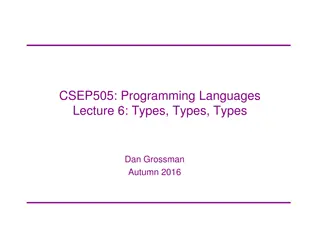
Generic Methods and Type Bounds: Making Code Reusable
Explore the use of generic methods and type bounds to enhance code reusability despite invariant subtyping. Understand the elegance of wildcards in Java for more expressive and readable code. Discover the limitations of invariant subtyping and how to optimize code design for flexibility. Stay ahead in CSE 331 Software Design & Implementation with essential insights for Spring 2021.
Download Presentation

Please find below an Image/Link to download the presentation.
The content on the website is provided AS IS for your information and personal use only. It may not be sold, licensed, or shared on other websites without obtaining consent from the author. If you encounter any issues during the download, it is possible that the publisher has removed the file from their server.
You are allowed to download the files provided on this website for personal or commercial use, subject to the condition that they are used lawfully. All files are the property of their respective owners.
The content on the website is provided AS IS for your information and personal use only. It may not be sold, licensed, or shared on other websites without obtaining consent from the author.
E N D
Presentation Transcript
CSE 331 Software Design & Implementation Kevin Zatloukal Spring 2021 Generics
Where are we? Done: basics of generic types for classes and interfaces basics of bounding generics Now: generic methods [not just using type parameters of class] generics and subtyping using bounds for more flexible subtyping using wildcards for more convenient bounds related digression: Java s array subtyping Java realities: type erasure unchecked casts equals interactions creating generic arrays CSE 331 Spring 2021 2
More verbose first Now: how to use type bounds to write reusable code despite invariant subtyping elegant technique using generic methods general guidelines for making code as reusable as possible (though not always the most important consideration) Then: Java wildcards essentially provide the same expressiveness less verbose: No need to declare type parameters that would be used only once better style because Java programmers recognize how wildcards are used for common idioms easier to read (?) once you get used to it CSE 331 Spring 2021 3
Best type for addAll interface Set<E> { // Adds all elements in c to this set // (that are not already present) void addAll(_______ c); } What is the best type for addAll s parameter? Allow as many clients as possible while allowing correct implementations CSE 331 Spring 2021 4
Best type for addAll interface Set<E> { // Adds all elements in c to this set // (that are not already present) void addAll(_______ c); } void addAll(Set<E> c); Too restrictive: does not let clients pass other collections, like List<E> better: use a supertype interface with just what addAll needs CSE 331 Spring 2021 5
Best type for addAll interface Set<E> { // Adds all elements in c to this set // (that are not already present) void addAll(_______ c); } void addAll(Collection<E> c); Still too restrictive: cannot pass a List<Integer> to addAll for a Set<Number> that should be okay because addAll implementations only need to read from c, not put elements in it but Java does not allow it this is the invariant-subtyping limitation CSE 331 Spring 2021 6
Best type for addAll interface Set<E> { // Adds all elements in c to this set // (that are not already present) void addAll(_______ c); } <T extends E> void addAll(Collection<T> c); The fix: bounded generic type parameter can pass a List<Integer> to addAll for a Set<Number> addAllimplementations won t know what element type T is, but will know it is a subtype of E it cannot add anything to collection c refers to but this is enough to implement addAll 7 CSE 331 Spring 2021
Generic methods get around invariance You cannot pass List<Integer> to method expecting List<Number> Java subtyping is invariant with respect to type parameters Get around it by making your method generic: <T extends Number> void sumList(List<T> nums) { double s = 0; for (T t : nums) s += t.doubleValue(); return s; } CSE 331 Spring 2021 8
Revisit copy method Earlier we saw this: <T> void copyTo(List<T> dst, List<T> src) { for (T t : src) dst.add(t); } Now we can do this (which is more general): <T1, T2 extends T1> void copyTo(List<T1> dst, List<T2> src) { for (T2 t : src) dst.add(t); } CSE 331 Spring 2021 9
Where are we? Done: basics of generic types for classes and interfaces basics of bounding generics Now: generic methods [not just using type parameters of class] generics and subtyping using bounds for more flexible subtyping using wildcards for more convenient bounds related digression: Java s array subtyping Java realities: type erasure unchecked casts equals interactions creating generic arrays CSE 331 Spring 2021 10
Examples [Compare to earlier version] interface Set<E> { void addAll(Collection<? extends E> c); } More idiomatic (but equally powerful) compared to <T extends E> void addAll(Collection<T> c); More powerful than void addAll(Collection<E> c); CSE 331 Spring 2021 11
Wildcards Syntax: for a type-parameter instantiation (inside the < >), can write: ? extends Type, some unspecified subtype of Type ? is shorthand for ? extends Object ? super Type, some unspecified superclass of Type A wildcard is essentially an anonymous type variable each ? stands for some possibly-different unknown type CSE 331 Spring 2021 12
More examples <T extends Comparable<T>> T max(Collection<T> c); No change because T used more than once CSE 331 Spring 2021 13
Wildcards Syntax: for a type-parameter instantiation (inside the < >), can write: ? extends Type, some unspecified subtype of Type ? is shorthand for ? extends Object ? super Type, some unspecified superclass of Type A wildcard is essentially an anonymous type variable each ? stands for some possibly-different unknown type use a wildcard when you would use a type variable only once (no need to give it a name) avoids declaring generic type variables communicates to readers of your code that the type s identity is not needed anywhere else CSE 331 Spring 2021 14
More examples <T> void copyTo(List<? super T> dst, List<? extends T> src) { for (T t : src) dst.add(t); } Why this works: lower bound of T for where callee puts values upper bound of T for where callee gets values callers get the subtyping they want Example: copy(numberList, integerList) Example: copy(stringList, stringList) CSE 331 Spring 2021 15
PECS: Producer Extends, Consumer Super Should you use extends or super or neither? use ? extends T when you get values (from a producer) no problem if it s a subtype (the co-variant subtyping case) use ? super T when you put values (into a consumer) no problem if it s a supertype (the contra-variant subtyping case) use neither (just T, not ?) if you both get and put can t be as flexible here <T> void copyTo(List<? super T> dst, List<? extends T> src); CSE 331 Spring 2021 16
More on lower bounds As we ve seen, lower-bound ? super T is useful for consumers Upper-bound ? extends T could be rewritten without wildcards, but wildcards preferred style where they suffice But lower-bound is only available for wildcards in Java this does not parse: <T super Foo> void m(Bar<T> x); no good reason for Java not to support such lower bounds except designers decided it wasn t useful enough to bother \_( )_/ CSE 331 Spring 2021 17
? versus Object ? indicates a particular but unknown type void printAll(List<?> lst) { } Difference between List<?> and List<Object>: can instantiate ? with any type: Object, String, List<Object> much more restrictive: e.g., wouldn't take a List<String> Difference between List<Foo> and List<? extends Foo>: In latter, element type is one unknown subtype of Foo Example: List<? extends Animal> might store only Giraffes only (no Zebras) Former allows anything that is a subtype of Foo in the same list Example: List<Animal> could store Giraffes and Zebras CSE 331 Spring 2021 18
Legal operations on wildcard types Object o; Number n; Integer i; PositiveInteger p; List<? extends Integer> lei; First, which of these is legal? lei = new ArrayList<Object>(); lei = new ArrayList<Number>(); lei = new ArrayList<Integer>(); lei = new ArrayList<PositiveInteger>(); lei = new ArrayList<NegativeInteger>(); CSE 331 Spring 2021 19
Legal operations on wildcard types Object o; Number n; Integer i; PositiveInteger p; List<? extends Integer> lei; First, which of these is legal? lei = new ArrayList<Object>(); lei = new ArrayList<Number>(); lei = new ArrayList<Integer>(); lei = new ArrayList<PositiveInteger>(); lei = new ArrayList<NegativeInteger>(); CSE 331 Spring 2021 20
Legal operations on wildcard types Which of these is legal? o = lei.get(0); n = lei.get(0); i = lei.get(0); p = lei.get(0); Object o; Number n; Integer i; PositiveInteger p; List<? extends Integer> lei; First, which of these is legal? lei = new ArrayList<Object>(); lei = new ArrayList<Number>(); lei = new ArrayList<Integer>(); lei = new ArrayList<PositiveInteger>(); lei = new ArrayList<NegativeInteger>(); CSE 331 Spring 2021 21
Legal operations on wildcard types Which of these is legal? o = lei.get(0); n = lei.get(0); i = lei.get(0); p = lei.get(0); Object o; Number n; Integer i; PositiveInteger p; List<? extends Integer> lei; First, which of these is legal? lei = new ArrayList<Object>(); lei = new ArrayList<Number>(); lei = new ArrayList<Integer>(); lei = new ArrayList<PositiveInteger>(); lei = new ArrayList<NegativeInteger>(); CSE 331 Spring 2021 22
Legal operations on wildcard types Which of these is legal? o = lei.get(0); n = lei.get(0); i = lei.get(0); p = lei.get(0); lei.add(o); lei.add(n); lei.add(i); lei.add(p); lei.add(null); Object o; Number n; Integer i; PositiveInteger p; List<? extends Integer> lei; First, which of these is legal? lei = new ArrayList<Object>(); lei = new ArrayList<Number>(); lei = new ArrayList<Integer>(); lei = new ArrayList<PositiveInteger>(); lei = new ArrayList<NegativeInteger>(); CSE 331 Spring 2021 23
Legal operations on wildcard types Which of these is legal? o = lei.get(0); n = lei.get(0); i = lei.get(0); p = lei.get(0); lei.add(o); lei.add(n); lei.add(i); lei.add(p); lei.add(null); Object o; Number n; Integer i; PositiveInteger p; List<? extends Integer> lei; First, which of these is legal? lei = new ArrayList<Object>(); lei = new ArrayList<Number>(); lei = new ArrayList<Integer>(); lei = new ArrayList<PositiveInteger>(); lei = new ArrayList<NegativeInteger>(); CSE 331 Spring 2021 24
Legal operations on wildcard types Object o; Number n; Integer i; PositiveInteger p; List<? super Integer> lsi; First, which of these is legal? lsi = new ArrayList<Object>; lsi = new ArrayList<Number>; lsi = new ArrayList<Integer>; lsi = new ArrayList<PositiveInteger>; lsi = new ArrayList<NegativeInteger>; CSE 331 Spring 2021 25
Legal operations on wildcard types Object o; Number n; Integer i; PositiveInteger p; List<? super Integer> lsi; First, which of these is legal? lsi = new ArrayList<Object>; lsi = new ArrayList<Number>; lsi = new ArrayList<Integer>; lsi = new ArrayList<PositiveInteger>; lsi = new ArrayList<NegativeInteger>; CSE 331 Spring 2021 26
Legal operations on wildcard types Which of these is legal? lsi.add(o); lsi.add(n); lsi.add(i); lsi.add(p); lsi.add(null); Object o; Number n; Integer i; PositiveInteger p; List<? super Integer> lsi; First, which of these is legal? lsi = new ArrayList<Object>; lsi = new ArrayList<Number>; lsi = new ArrayList<Integer>; lsi = new ArrayList<PositiveInteger>; lsi = new ArrayList<NegativeInteger>; CSE 331 Spring 2021 27
Legal operations on wildcard types Which of these is legal? lsi.add(o); lsi.add(n); lsi.add(i); lsi.add(p); lsi.add(null); Object o; Number n; Integer i; PositiveInteger p; List<? super Integer> lsi; First, which of these is legal? lsi = new ArrayList<Object>; lsi = new ArrayList<Number>; lsi = new ArrayList<Integer>; lsi = new ArrayList<PositiveInteger>; lsi = new ArrayList<NegativeInteger>; CSE 331 Spring 2021 28
Legal operations on wildcard types Which of these is legal? lsi.add(o); lsi.add(n); lsi.add(i); lsi.add(p); lsi.add(null); o = lsi.get(0); n = lsi.get(0); i = lsi.get(0); p = lsi.get(0); Object o; Number n; Integer i; PositiveInteger p; List<? super Integer> lsi; First, which of these is legal? lsi = new ArrayList<Object>; lsi = new ArrayList<Number>; lsi = new ArrayList<Integer>; lsi = new ArrayList<PositiveInteger>; lsi = new ArrayList<NegativeInteger>; CSE 331 Spring 2021 29
Legal operations on wildcard types Which of these is legal? lsi.add(o); lsi.add(n); lsi.add(i); lsi.add(p); lsi.add(null); o = lsi.get(0); n = lsi.get(0); i = lsi.get(0); p = lsi.get(0); Object o; Number n; Integer i; PositiveInteger p; List<? super Integer> lsi; First, which of these is legal? lsi = new ArrayList<Object>; lsi = new ArrayList<Number>; lsi = new ArrayList<Integer>; lsi = new ArrayList<PositiveInteger>; lsi = new ArrayList<NegativeInteger>; CSE 331 Spring 2021 30
Where are we? Done: basics of generic types for classes and interfaces basics of bounding generics Now: generic methods [not just using type parameters of class] generics and subtyping using bounds for more flexible subtyping using wildcards for more convenient bounds related digression: Java s array subtyping Java realities: type erasure unchecked casts equals interactions creating generic arrays CSE 331 Spring 2021 31
Java arrays We know how to use arrays: declare an array holding Type elements: Type[] get an element: x[i] set an element x[i] = e; Java included the syntax above because it s common and concise But can reason about how it should work the same as this: class Array<T> { public T get(int i) { magic } public T set(T newVal, int i) { magic } } So: If Type1 is a subtype of Type2, how should Type1[] and Type2[] be related?? CSE 331 Spring 2021 32
Java Arrays Given everything we have learned, if Type1 is a subtype of Type2, then Type1[] and Type2[] should be unrelated invariant subtyping for generics because arrays are mutable CSE 331 Spring 2021 33
Surprise! Given everything we have learned, if Type1 is a subtype of Type2, then Type1[] and Type2[] should be unrelated invariant subtyping for generics because arrays are mutable But in Java, if Type1 is a subtype of Type2, then Type1[]is a subtype of Type2[] (covariant subtyping) not true subtyping: the subtype does not support setting an array element to hold a Type2 (spoiler: throws an exception) Java (and C#) made this decision in pre-generics days needed to write reusable sorting routines, etc. also \_( )_/ CSE 331 Spring 2021 34
What can happen: the good LibraryHolding Programmers can use this subtyping to do okay stuff Book CD void maybeSwap(LibraryHolding[] arr) { if(arr[17].dueDate() < arr[34].dueDate()) // swap arr[17] and arr[34] } // client with subtype Book[] books = ; maybeSwap(books); // relies on covariant // array subtyping CSE 331 Spring 2021 35
What can happen: the bad Something in here must go wrong! LibraryHolding void replace17(LibraryHolding[] arr, LibraryHolding h) { arr[17] = h; } Book CD // client with subtype Book[] books = ; LibraryHolding theWall = new CD("Pink Floyd", "The Wall", ); replace17(books, theWall); Book b = books[17]; // would hold a CD b.getChapters(); // so this would fail CSE 331 Spring 2021 36
Javas choice Java normally guarantees run-time type is a subtype of the compile-time type this was violated for the Book b variable To preserve the guarantee, Java must never get that far: each array knows its actual run-time type (e.g., Book []) trying to store a supertype into an index causes ArrayStoreException (at run time) So the body of replace17 would raise an exception even though replace17 is entirely reasonable and fine for plenty of careful clients every Java array-update includes this run-time check (array-reads never fail this way why?) beware careful with array subtyping CSE 331 Spring 2021 37
Where are we? Done: basics of generic types for classes and interfaces basics of bounding generics Now: generic methods [not just using type parameters of class] generics and subtyping using bounds for more flexible subtyping using wildcards for more convenient bounds related digression: Java s array subtyping Java realities: type erasure unchecked casts equals interactions creating generic arrays CSE 331 Spring 2021 38
Type erasure All generic types become type Object once compiled List<String> lst = new ArrayList<String>(); at runtime, becomes List<Object> lst = new ArrayList<Object>(); CSE 331 Spring 2021 39
Type erasure All generic types become type Object once compiled gives backward compatibility (a selling point at time of adoption) at run-time, all generic instantiations have the same type Cannot use instanceof to discover a type parameter Collection<?> cs = new ArrayList<String>(); if (cs instanceof Collection<String>) { // illegal ... } CSE 331 Spring 2021 41
Generics and casting Casting to generic type results in an important warning List<?> lg = new ArrayList<String>(); // ok List<String> ls = (List<String>) lg; // warn Compiler gives a warning because this is something the runtime system will not check for you Usually, if you think you need to do this, you're wrong a real need to do this is extremely rare Object can also be cast to any generic type public static <T> T badCast(T t, Object o) { return (T) o; // unchecked warning } CSE 331 Spring 2021 42
The bottom-line Java guarantees a List<String> variable always holds a (subtype of) the raw typeList Java does not guarantee a List<String> variable always has only String elements at run-time will be true if no unchecked cast warnings are shown compiler inserts casts to/from Object for generics if these casts fail, hard-to-debug errors result: often far from where conceptual mistake occurred So, two reasons not to ignore warnings: 1. You re violating good style/design/subtyping/generics 2. You re risking difficult debugging CSE 331 Spring 2021 43
Recall equals class Node { @Override public boolean equals(Object obj) { if (!(obj instanceof Node)) { return false; } Node n = (Node) obj; return this.data().equals(n.data()); } } CSE 331 Spring 2021 44
equals for a parameterized class Erasure: Type arguments do not exist at runtime class Node<E> { @Override public boolean equals(Object obj) { if (!(obj instanceof Node<E>)) { return false; } Node<E> n = (Node<E>) obj; return this.data().equals(n.data()); } } CSE 331 Spring 2021 45
equals for a parameterized class class Node<E> { @Override public boolean equals(Object obj) { if (!(obj instanceof Node<?>)) { return false; } Node<E> n = (Node<E>) obj; return this.data().equals(n.data()); } } More erasure: At run time, do not know what E is and will not be checked, so don t indicate otherwise CSE 331 Spring 2021 46
equals for a parameterized class class Node<E> { @Override public boolean equals(Object obj) { if (!(obj instanceof Node<?>)) { return false; } Node<?> n = (Node<?>) obj; return this.data().equals(n.data()); } } right thing if this and n differ on element type Works if the type of obj is Node<Elephant> or Node<String> or Node<? extends Object> Leave it to here to do the Node<Elephant> Node<String> CSE 331 Spring 2021 47
Generics and arrays public class Foo<T> { private T aField; // ok private T[] anArray; // ok public Foo() { aField = new T(); // compile-time error anArray = new T[10]; // compile-time error } } You cannot create objects or arrays of a parameterized type type info is not available at runtime CSE 331 Spring 2021 48
Necessary array cast public class Foo<T> { private T aField; private T[] anArray; @SuppressWarnings("unchecked") public Foo(T param) { aField = param; anArray = (T[]) new Object[10]; } } You can declare variables of type T, accept them as parameters, return them, or create arrays by casting Object[] casting to generic types is not type-safe (hence the warning) Effective Java: use ArrayList instead CSE 331 Spring 2021 49






















